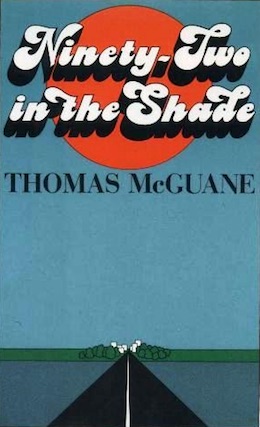I should get this off my chest right away. As a writer, I’m a bit of a frenzied loon when it comes to recommending fiction. Overly zealous? Yup. Opinionated to the point of grating? Sure. Once I stumble upon something that bowls me over (no matter what the genre or format) I’m the world champion at the evangelizing throat-throttle.
The source of this fervor, or fever if you will, probably originates from my appreciation of life’s linear limits, as in, with what little time we have, why read something trite when you can read something astonishing? Luckily the immense world-interpreting power of fiction occurred to me at an early age, and now I recognize this as a blessing. I say luckily because many in my life back then scornfully advised that fiction (sci-fi, horror, and comics especially) were an utter waste of my time. Every now and then I run into these same cynics and I’m not surprised by their vast existential bewilderment. Regrettably, the narrative lens that could’ve helped them understand our crazy and fragile world they eschewed long ago.
Now as an author, I occasionally get asked for my favorite novel. For bibliophiles this is always an exacting question, but for writers it’s a nearly impossible one. But if forced to name the book I push most often on others it is Thomas McGuane’s 1973 novel Ninety-two in the Shade.
Now, befitting my awareness of our limited time, no one would ever call me a big fan of slow boilers or Dickensian doorstops. Does this mean then that I make snap judgments with books? Absolutely, and anyone who says otherwise is a liar. Snap judgments often are the only way to make a choice. Consequently, the unspoken imperative for all would-be novelists is to impress the hell out of the reader right now. As with a busker on a train platform or a poet at an open mic night, the opening salvo is no place to be out of tune or to be futzing around. In my opinion, the reader deserves this courtesy.
And McGuane does this in Ninety-two in the Shade like a rock star. For aspiring writers it’s like a mini masters class on satire and a terrific guide on how to open a novel. With its first nine or ten paragraphs, the novel establishes everything. Mood, setting, tone, and the impending trajectory of the protagonist Thomas Skelton all within a minute’s reading.
Today, in our polemically-charged times, the first sentence still packs a wallop.
Nobody knows, from sea to shining sea, why we are having all this trouble with our republic…
A bit of the prognostic? Maybe. But more accurately I believe this opening line articulates the universal timelessness of the tale.
From there McGuane’s prose doesn’t just introduce his forlorn protagonist. In the wee small hours before a Florida dawn, it heats up with such gifted description that the hook of haunted urgency is set. The reader learns so much about Skelton’s predicament—
his fading intemperance, his whimsical enchantment with nature, his empathetic and crippled mind—it’s spellbinding. With such thrift, I am always amazed at the smallest details. Who knew a tub resting on “frog’s feet” or a traffic light changing to red could symbolize so much?
A favorite section for me entails the two “hitchhiking” paragraphs late in the opening. Framed by the sentences “The trees along the road were full of catbirds…” and “This was the epoch of uneasy alliances…” right there, shattered like a fun house mirror, the protagonist’s madness is laid bare. Simultaneously McGuane defuses the horror of Skelton’s mental crisis with hilarity, all the while underscoring the novel’s theme of carrying on no matter what.
Ultimately, I think this brilliant opening illustrates the virtues all authors should strive for—be it fantasy, horror, science fiction, romance, or any other genre. Some may disagree, but between you and me, deep down we both realize they’re wrong. I know the hell-for-leather immediacy, the waggishness, and the damn the torpedoes attitude are just the things I want in my science fiction. To reiterate an earlier point, time is indeed precious and our fragile world even more so. It’s my responsibility as an author to cut, polish, and hold up that lens so that those reading can maybe make sense of their world. If not, it’s my hope to provide some small measure of escape, at least for a little while.
Please, read these opening pages of Ninety-two in the Shade and perhaps you too will fall in love with this book.
Kieran Shea is the author of Koko Takes a Holiday, Koko the Mighty and the soon to be released Off Rock from Titan Books. His short fiction has appeared in many publications including Ellery Queen Mystery Magazine, Thuglit, Dogmatika, and Crimefactory. Nominated for the Story South’s Million Writers Award twice, he lives in Annapolis, Maryland.










